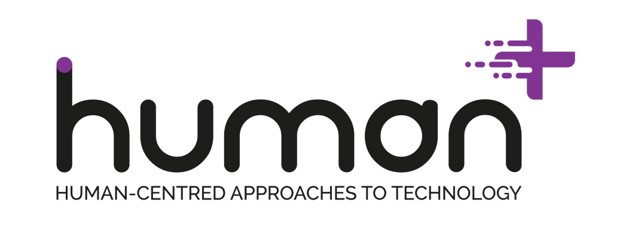HUMAN+ Interview Series
 The HUMAN+ fellowship programme is seriously ambitious. Ultimately, it seeks to develop Trinity as a European centre of excellence for human-centred technology research. Key to this is developing a cadre of researchers that can work across and within diverse disciplines. Integrating the perspectives of the Arts and Humanities, which are much newer to this field, is a particular focus. To facilitate this pioneering approach fellows are allocated supervisors from both the Computer Sciences and the Arts and Humanities, so academic staff are also working together in new ways. To top it off, there is a major focus on intersectoral engagement. Enterprise partnerships immerse fellows and supervisors with the real-world challenges of a broad range of organisations working in their areas of interest while providing organisations with an opportunity to exchange ideas and networks with world class researchers.
The HUMAN+ fellowship programme is seriously ambitious. Ultimately, it seeks to develop Trinity as a European centre of excellence for human-centred technology research. Key to this is developing a cadre of researchers that can work across and within diverse disciplines. Integrating the perspectives of the Arts and Humanities, which are much newer to this field, is a particular focus. To facilitate this pioneering approach fellows are allocated supervisors from both the Computer Sciences and the Arts and Humanities, so academic staff are also working together in new ways. To top it off, there is a major focus on intersectoral engagement. Enterprise partnerships immerse fellows and supervisors with the real-world challenges of a broad range of organisations working in their areas of interest while providing organisations with an opportunity to exchange ideas and networks with world class researchers.
The programme leadership is also pioneering, a partnership between the Trinity Long Room Hub Arts and Humanities Institute and the Science Foundation Ireland funded Adapt Centre for Digital Content Technology. Its excellence has been recognised by cofunding from the European Commission’s Horizon 2020 Marie Skłodowska-Curie Actions.
The HUMAN+ programme will welcome up to eighteen postdoctoral researchers throughout its run. Over the last twelve months, its four inaugural fellows, Dr. Qian Xiao, Dr. Kata Szita Dr. Nicola Palladino, and Dr. phil Pat Treusch, have all moved to Dublin from around the world, bringing with them a wide range of skills and knowledge areas. They have spent their time conducting research with their inter-disciplinary supervisory team and collaborating on public engagement projects in order to develop new knowledge frameworks to connect the fields of humanities, arts and technology. Here, at the end of the programme’s first year, the four researchers reflect on their experiences as part of HUMAN+.
So, what does this cutting-edge research look like? Each fellow sat down with the Office of the Dean of Research to discuss the unique opportunities HUMAN+ has brought to their careers. Over the next month, in the run-up to START (Start Talking About Research Today) on the 30th of September, TCD’s biggest annual research showcase, we will publish a profile of each researcher alongside input from their supervisory teams and enterprise partners. These pieces offer insights into how HUMAN+ is shaping the future of research, indicating the challenges and opportunities being forged in the fields of feminism and robotics, the future of online governance, virtual reality and loneliness, and education and integrated computer teaching systems. By interviewing the current fellows on their trans-disciplinary work, we will share the visions being fostered by the Human+ programme, highlighting how they are shaping the careers of Ireland’s foremost international scholars.
These profiles demonstrate the unique and transformative opportunities Human+ has to offer, and illustrate the viability and necessity of a technological future built upon a foundation of trans-disciplinary work with strong connections between academia and the arts, industry, and policy. Throughout these interviews, the researchers reflect on how their multi-disciplinary supervisory teams have added new dimensions to their research, the long-term links they are establishing with enterprise partners, the exploratory work they are doing at the intersection of the sciences and humanities, as well as their views on Dublin as an international research environment.
A common theme that runs throughout these profiles is the diversity of thought and application found within the initiative. This further demonstrates the viability of HUMAN+ as a pathway for prospective international researchers across the disciplines, as well as the array of potentials for future enterprise partners and academic supervisors. Prof. Jane Ohlmeyer, the project’s Humanities co-ordinator reflects that these fellows “will contribute to radical solutions for the monumental global challenges we face as a society,” while Computer Science co-ordinator Prof. Vincent Wade describes them as “future research leaders in the area of human-centric approaches to technology innovation.” We hope you will check back in each week to find out more about how our HUMAN+ fellows are meeting these challenges.
- Article written by Dr Sarah Cullen
HUMAN+
Human+ is a five-year international, inter- and transdisciplinary fellowship programme that will conduct ground breaking research that addresses human centric approaches to technology development. Supported by the prestigious European Commission (EC) Horizon 2020 Marie Skłodowska-Curie COFUND Action, Human+ is led by the Trinity Long Room Hub Arts and Humanities Research Institute and ADAPT, the Science Foundation Ireland Centre for Digital Content Innovation at Trinity College Dublin. The programme is further supported by unique relationships with HUMAN+ Enterprise Partners who co-fund the fellowships and provide a unique perspective.
The HUMAN+ project has received funding from the European Union’s Horizon 2020 research and innovation programme under the Marie Skłodowska-Curie grant agreement No 945447.

